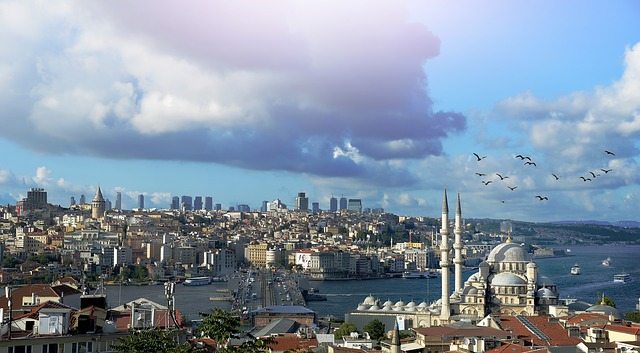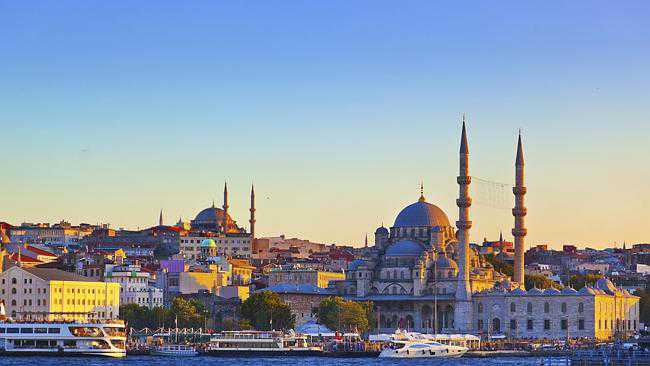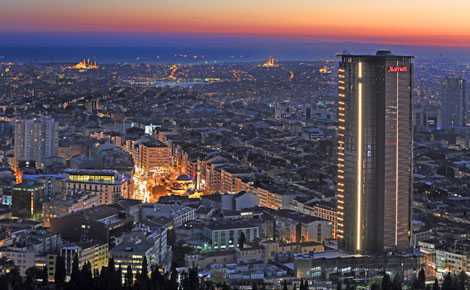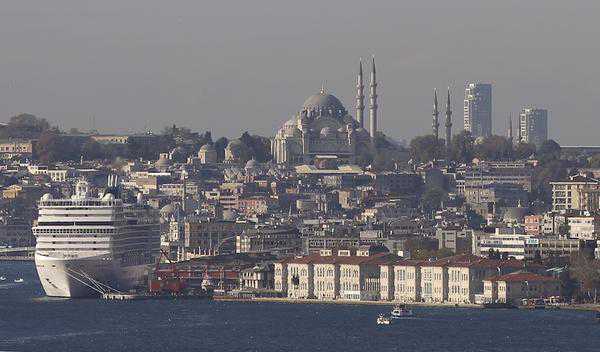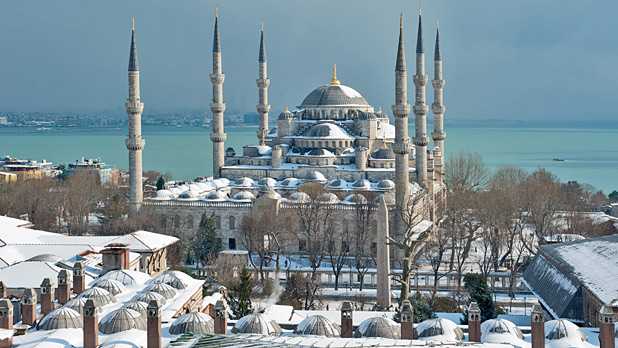It’s easy to get infatuated with a city that’s both old and new, religious and secular, European and Asian.
Intoxicating Istanbul
Tourists dining at restaurants along the Galata Bridge, with Yeni Cami Mosque in the background. Photo: Getty Images
The sun has barely begun to rise and the morning prayers begin. Although I’d rather sleep in a little more, it’s such a seductive, yet jarringly exotic, sound. The prayers get louder, more voices join in, there’s no way I’ll fall back asleep. My day in Istanbul – like every day here – has begun early.
Istanbul is an energetic city caught between the traditions of Islam and modern Western culture. Women in head-to-toe burqas walk side by side with squealing girls clad in minuscule shorts and teeny tops. Mosques are full, but so are the bars. Street food peddlers saunter alongside chic Istanbulians clad in the latest designer gear, weathered kebab shops sit alongside trendy restaurants with rooftop views, and narrow, cobbled-lane waterfront villages are a hop and a skip away from urban corporate districts.
Dramatic and squalid, old and new, European and Asian … it’s easy to get infatuated with the mishmash that is Istanbul.
Sultanahmet is the heart of old Istanbul and home to many of the famous sites you’ll likely be visiting. A hub of a different kind is Taksim Square, the core of modern Istanbul and one of the largest public gathering spaces in the world. The square and nearby district of Beyoglu (home to the famous Istiklal Avenue) are known for their perpetually busy and rambunctious nightlife.
Nearby, Karaköy is Istanbul’s up-and-coming suburb, home to sophisticated art galleries, funky boutiques and a swathe of newly-opened opulent hotels. Besiktas is another flourishing hot spot: the once-gritty fisherman hangout has turned over a new leaf and is now home to some of Istanbul’s newest international boutiques, hotels and bars.
I choose to stay in Beyoglu and walk to Sultanahmet across the Galata Bridge most mornings for sightseeing (there are trams and funiculars, too, taxis take too long). It’s a good 40 or so minutes’ walk, but that’s the beauty of being in Istanbul – some of the most interesting sights are the ones you encounter when you’re not looking for them. Meandering along cobblestone laneways, stopping to buy fresh-baked simit bread from a street stall, or joining the local men for a cup of Turkish tea in a sidewalk cafe … these are highlights you’ll remember in years to come.
Walking across the Galata Bridge itself is a grand experience. The bridge that spans the Golden Horn waterway is dotted with fishermen, street food vendors and young love-struck couples enjoying the view – it’s a fascinating way to enter the old city each day.
You need at least a few days to fully immerse yourself in the rich cultural offerings in Sultanahmet. I plan for one or two major sights a day, with a drawn-out lunch stop at one of the many rooftop restaurants. There’s nothing quite like feasting on succulent kebab pieces, served alongside ripe tomatoes and fresh salad, overlooking elaborate minarets. It’s on these rooftops that you really feel you are in Istanbul – the skyline, with its soaring minarets and modern skyscrapers, is one of the best in the world.
Six of Istanbul’s dazzling minarets belong to Sultan Ahmed (also known as the Blue Mosque because of the blue Iznik tiles adorning the elaborate interior). It’s one of only a handful of mosques in the world to boast six turrets and is a visual feast inside and out. The mosque is still used for prayers, so visiting times are limited and strictly controlled. Hagia Sophia, a sixth-century Byzantine masterpiece, is easier to visit. It was once a Greek Orthodox church, later an imperial mosque, and today it’s a museum. Although it was a mosque for about 500 years, you can still see some of its Orthodox church remnants, which makes for a thought-provoking and educational visit.
On a day when the heat gets too much I escape into one of Istanbul’s peculiarly beautiful attractions, the underground Basilica Cistern. The cistern offers an insight into the intricate system that once brought water into Istanbul, and today serves as a peaceful (and cool) respite from the bustling life above.
The lively frenzy that is Istanbul is most evident at the marketplace. The epic Grand Bazaar, one of the oldest and biggest souks in the world, is an assault on the senses, with anything and everything being bartered under one roof. The Spice Bazaar offers a similar experience – more tea, more saffron, more glassware than you’d ever imagine.
Sultanahmet is a dynamic region during the day, but at nightfall it’s Beyoglu’s Istiklal Avenue that comes alive – with a different kind of energy. Young things in the latest threads flock to suave restaurants to dine on exorbitantly priced food washed down with colourful cocktails, while groups of families take ownership of the more casual eateries, talking, laughing and ordering one sumptuous dish after another. I watch with envy as waiters weave through the crowds with plates crammed with all kinds of local delicacies.
Those who like meat, fish and anything sweet will delight in all of Istanbul’s culinary offerings. Fresh-caught hamsi (small black sea anchovies) fried before your eyes, smoky lamb chunks grilled slowly over coals, and a plethora of sticky and sweet morsels studded with nuts and gussied up with sugar (dessert in Istanbul is a hedonistic affair) are all part of the nocturnal dining experience in this part of town.
As dawn breaks, late-night diners and partygoers traipse alongside early-risers starting their day. The first of the prayer callers sings out with the morning prayer. Another day in intoxicating Istanbul has begun.
TRIP TIPS
Getting there
Qantas (qantas.com.au) code shares flights with Emirates to Istanbul via Dubai from Sydney, Melbourne, Perth, Brisbane and Adelaide.
Where to stay
Located in trendy Besiktas, the W Istanbul Hotel has 136 Ottoman-inspired rooms and suites, as well as gardens, terraces, a cabana, a gym and two restaurants to take care of all your needs; wistanbul.com.tr.
Tomtom Suites/The Old Franciscan House, part of the Small Luxury Hotels of the World group, offers a boutique stay in the trendy Beyoglu district, with beautiful panoramic views of the old city from the rooftop terrace; slh.com.
If you’re flash with cash, book a palace suite at Çıragan Palace Kempinski Hotel, the former Ottoman palace built by Sultan Abdülaziz. Your private butler will greet you at the helipad and you’ll be whisked away into a world of indulgence; kempinski.com.
What to wear
For an Islamic country, Turkey’s capital is very liberal in terms of dress, but it’s still best to be respectful. Cover legs and shoulders inside mosques; everywhere else, dress neatly and take your cue from what the locals are wearing.
What to drink
Turkish tea in a sidewalk cafe.
Essential phrases
Hello Merhaba
Thank you Tesekkür ederim
Excuse me Affedersiniz
How much does it cost? Ne kadar?
Life-affirming experience
A cuppa with a local. Life’s simplest pleasures can be the most profound.
Best memento
A dazzling hand-made glass lamp, if you can get it home. Or delight friends back home with some Turkish delight.
Essential reading
In Turkey I am Beautiful by Brendan Shanahan.
More information
goturkey.com
Read more: http://www.smh.com.au/lifestyle/intoxicating-istanbul-20140415-36pkq.html#ixzz2zQwDJ2xY

